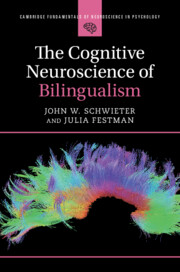Book contents
- The Cognitive Neuroscience of Bilingualism
- Cambridge Fundamentals of Neuroscience in Psychology
- The Cognitive Neuroscience of Bilingualism
- Copyright page
- Contents
- Figures
- Tables
- Acknowledgments
- Chapter One Theories and Methods in the Cognitive Neuroscience of Bilingualism
- Chapter Two Neural Representations and Language Processing in the Bilingual Brain
- Chapter Three Bilingualism, Language Development, and Brain Plasticity
- Chapter Four Aphasia and the Bilingual Brain
- Chapter Five Cross-Linguistic Effects of Bilingualism
- Chapter Six Bilingual Lexical and Conceptual Memory
- Chapter Seven Cognitive and Neurocognitive Effects of Bilingualism
- Chapter Eight Conclusion
- References
- Index
- References
Chapter Seven - Cognitive and Neurocognitive Effects of Bilingualism
Published online by Cambridge University Press: 01 October 2023
- The Cognitive Neuroscience of Bilingualism
- Cambridge Fundamentals of Neuroscience in Psychology
- The Cognitive Neuroscience of Bilingualism
- Copyright page
- Contents
- Figures
- Tables
- Acknowledgments
- Chapter One Theories and Methods in the Cognitive Neuroscience of Bilingualism
- Chapter Two Neural Representations and Language Processing in the Bilingual Brain
- Chapter Three Bilingualism, Language Development, and Brain Plasticity
- Chapter Four Aphasia and the Bilingual Brain
- Chapter Five Cross-Linguistic Effects of Bilingualism
- Chapter Six Bilingual Lexical and Conceptual Memory
- Chapter Seven Cognitive and Neurocognitive Effects of Bilingualism
- Chapter Eight Conclusion
- References
- Index
- References
Summary
This chapter presents criteria characterizing the “bilingual experience” examined on three different levels: language processing, cognitive processing, and structural and functional changes in the brain. On all three levels, numerous studies have been conducted and have yielded inconclusive results. A bilingual experience is a change-inducing event leading to speedy adaptations on different levels of processing, with brain changes at its basis to accommodate for additional demands and specific requirements which are dependent on the length and intensity of the bilingual experience. A surge of proposals on how to measure the bilingual experience has recently appeared in the literature. The brain adapts from early on, even in infants, allowing for early indications of the effects of bilingual experience, in particular on perception and attentional aspects. The experience-dependent alterations in the brain at various locations, intensities, and timelines seem to align with our current understanding of the cognitive neuroscientific effects of bilingualism much more than previous views of separate brain areas involved in the processing and representation of each language.
Keywords
- Type
- Chapter
- Information
- The Cognitive Neuroscience of Bilingualism , pp. 151 - 172Publisher: Cambridge University PressPrint publication year: 2023

